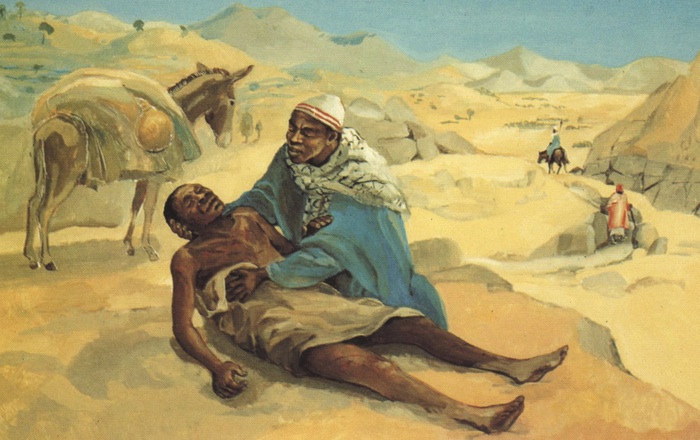Commentary on Luke 10:25-37
How do we preach on texts that everybody knows and where the meaning is very clear?
How do we preach on the same texts we’ve preached on many times before, perhaps to the very same congregation? That’s our situation this Sunday. My advice is: never look back on your old sermons. Preach this text to these people and to our times. Your people likely won’t remember what you said before anyway.
We can assume that when the lawyer asked Jesus, “And who is my neighbor?” he was thinking to himself, “I have taken very good care of my neighbors” — that is, the good Jewish people living in his neighborhood. Jesus’ reply expanded the “neighborhood” well beyond the lawyer’s view.
Societies in biblical days were strongly tribal. You identified with “your people.” There was much hostility between the Jews of Judah and Galilee against the Samaritans, who considered themselves Jewish, but whose center of worship was on Mount Gerizim rather than Jerusalem. The orthodox Jews considered Samaritans not only heretical but also as ceremonially unclean. In contrast, the priest and Levite were at the heart of temple worship.
When I preach on this text this Sunday I will emphasize that the lawyer knew his Scriptures very well. When Jesus asks, “What is written in the law?” the lawyer quotes from Deuteronomy 6:5 and Leviticus 19:18, verses we now call the “two great commandments: love God and love your neighbor,” reminding us of the “two tablets” of the law which Moses brought down from Mount Sinai.
The first commandment about loving God is the “Shema” which every Jewish child knows by heart, beginning with “Hear (shema), O Israel. The Lord is our God, the Lord alone…” It is the prayer the lawyer in this story would have recited twice every day as an adult Jewish man.
The appointed Old Testament reading for this Sunday is Deuteronomy 30:9-14, which also refers to the first of these “great commandments”: “turn to the Lord your God with all your heart and with all your soul.”
However, the story of the Good Samaritan is about the second of Jesus’ great commandments, so I will substitute Leviticus 19:18, 33-34 for today’s Old Testament reading (yes, you can do that) because it reinforces the meaning of the Gospel reading so clearly:
“… you shall love your neighbor as yourself. I am the LORD… When an alien resides with you in your land, you shall not oppress the alien. The alien who resides with you shall be to you as the citizen among you; you shall love the alien as yourself, for you were aliens in the land of Egypt: I am the Lord your God.”
The concern for the stranger and alien is a repeated theme throughout the Torah. Speaking through Moses God makes very clear to the people of Israel that they should care for the strangers and aliens among them. God “loves the strangers, providing them food and clothing. You shall also love the stranger, for you were strangers in the land of Egypt (Deuteronomy 10:18-19).
Why do we love the stranger and the alien? Notice the repeated refrain in Leviticus, repeated not only in these two verses, but over and over again in the giving of society’s laws: “I am the Lord your God.” God has created all people, and our concern for all people shatters the fences of our own tribes.
Notice also how Jesus changes the lawyer’s question. The lawyer asked, “And who is my neighbor?” By his definition the neighbors of the story would have been the priest and the Levite, members of his group, not the alien and heretical Samaritan. However at the end of the story, Jesus changes the question by asking, “Which of these three, do you think was a neighbor?” that is, “Who proved to be a neighbor?” Neighbor is as neighbor does, so to speak. “Neighbor” is not defined by location or group but by those who need concern and care.
We are all “tribal” by instinct and by habit. We are most comfortable with and usually care most about those like us. But now we live side-by-side with people of many different tribes. My father grew up in a small town in South Dakota where his “neighbors” were Norwegian Lutherans just like him. He didn’t even meet a Roman Catholic until his late teens. Now my grandchildren attend school with African-Americans, Hispanics, Muslims and a few children from other countries.
A good sermon will need examples, and today it’s not hard to find them. We are surrounded by people different from us who need our help. We can cite examples from the work of our own congregation, helping others in the community, as well as reaching out to the world through different denominational ministries.
The stories of the Good Samaritan and the Prodigal Son are the two best known and most beloved of all Jesus’ teachings. As well known as they are, they need constant repeating, because their messages are so necessary in understanding what Christianity is all about. The Christian faith, following Jesus, reaches out beyond our tribal walls. Our “neighbors” are those who need us.


July 14, 2013